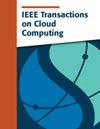Cloud-Assisted Laconic Private Set Intersection Cardinality
IF 5.3
2区 计算机科学
Q1 COMPUTER SCIENCE, INFORMATION SYSTEMS
引用次数: 0
Abstract
Laconic Private Set Intersection (LPSI) is a type of PSI protocols characterized by the requirement of only two-round interactions and by having a reused message in the first round that is independent of the set size. Recently, Aranha et al. (CCS’2022) proposed a LPSI protocol that utilizes the pairing-based accumulator. However, this protocol heavily relies on time-consuming bilinear pairing operations, which can potentially cause a bottleneck. Furthermore, in certain scenarios like contact tracing, it is sufficient to only reveal the intersection cardinality. To tackle this problem and expand on its functionalities, we introduce a cloud-assisted two-party LPSI cardinality (TLPSI-CA) that inherits the properties of LPSI. Interestingly, the cloud-assisted TLPSI-CA eliminates the direct interaction between the sender and receiver, enabling the sender's message to be reused across any number of protocol executions. Besides, we further extend it to the multi-party scenario, which also possesses laconic properties. Then, we prove the two protocols’ security in achieving the defined ideal functionalities. Finally, we evaluate the performance of both protocols and find that TLPSI-CA successfully reduces the local computation costs for participants. Additionally, the multi-party protocol performs similarly to TLPSI-CA, with the exception of the higher communication costs incurred by the receiver.云辅助 Laconic 私有集交集卡性
Laconic Private Set Intersection(LPSI)是一种 PSI 协议,其特点是只要求两轮交互,并且第一轮中的重复使用信息与集合大小无关。最近,Aranha 等人(CCS'2022)提出了一种利用配对累加器的 LPSI 协议。然而,该协议严重依赖于耗时的双线性配对操作,可能会造成瓶颈。此外,在某些情况下(如接触追踪),只需揭示交叉点的卡方性就足够了。为了解决这个问题并扩展其功能,我们引入了一种继承了 LPSI 特性的云辅助双方 LPSI 卡片性(TLPSI-CA)。有趣的是,云辅助 TLPSI-CA 消除了发送方和接收方之间的直接交互,使发送方的信息可以在任意数量的协议执行中重复使用。此外,我们还将其进一步扩展到多方场景,该协议同样具有冗长特性。然后,我们证明了这两个协议在实现所定义的理想功能方面的安全性。最后,我们评估了两个协议的性能,发现 TLPSI-CA 成功地降低了参与者的本地计算成本。此外,多方协议的性能与 TLPSI-CA 相似,但接收方的通信成本较高。
本文章由计算机程序翻译,如有差异,请以英文原文为准。
求助全文
约1分钟内获得全文
求助全文
来源期刊

IEEE Transactions on Cloud Computing
Computer Science-Software
CiteScore
9.40
自引率
6.20%
发文量
167
期刊介绍:
The IEEE Transactions on Cloud Computing (TCC) is dedicated to the multidisciplinary field of cloud computing. It is committed to the publication of articles that present innovative research ideas, application results, and case studies in cloud computing, focusing on key technical issues related to theory, algorithms, systems, applications, and performance.
 求助内容:
求助内容: 应助结果提醒方式:
应助结果提醒方式:


